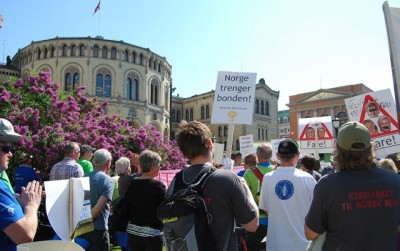Late night negotiations between the government and its support parties failed to reach a compromise on this year’s agricultural settlement. The Christian Democrats and Liberals said they were disappointed the government ended the negotiations around two o’clock on Friday morning after refusing to be swayed on its offer to farmers. Meanwhile, new figures show the income farmers generate from agriculture alone can be as low as 20 percent of their household revenue.

The Christian Democrats (Kristelig Folkeparti, KrF) agriculture spokeswoman Line Henriette Hjemdal told Norwegian Broadcasting (NRK) the parties had pushed for NOK 250 million (USD 42 million) in state support, instead of the NOK 150 million increase and structural changes the government proposed this year. Farmers want NOK 1.5 billion. The state already provides NOK 13 billion in support through protectionist policies and regulatory schemes like direct subsidies and price setting.
“We were quite close, so I think it is surprising and a shame that the government parties chose to break the negotiations,” Hjemdal said. “Especially considering that we were agreed on the direction, but not the pace and scope, and not least becasue agricultre is a part of our cooperation agreement.”
The parties were full of optimism heading into the talks at nine o’clock on Thursday night. News bureau NTB quoted a Liberal party source saying an agreement was imminent, ahead of the government submitting the proposal to Parliament on Friday.
“We wanted to increase the structure for a better economy, especially for the small and middle-sized farmers,” Hjemdal and Liberal spokesman Terje Breivik told NRK. A complaint from unions has been that Agriculture Minister Sylvi Listhaug’s proposal removes some of the current equalization measures between small and large farms, which they argue would favour large landholders to the detriment of smaller ones. “Here, there was too little willingness to negotiate among the Conservatives and Progress Party.”
Responsibility on opposition parties
The Conservative (Høyre) and Progress Party (Fremskrittspartiet, Frp) coalition needed the backing of its partner parties after the Labour Party (Arbeiderpartiet, Ap) stated on Thursday it would not support the government’s agricultural settlement bill in Parliament.
The Liberals and KrF made it clear that after the government broke negotiations on Thursday night, they would be coming to Parliament with their own suggestions. “We will now go to Parliament when we get the bill in the course of the day, and try to get a majority on our cases and our views,” said Hjemdal. She sidestepped questions about whether the parties would seek a majority with Labour. “I have a plan that we will start the negotiations with Frp and the Conservatives in Parliament, but then the two parties must come to meet us.”
The leader of the parliamentary industry committee, Geir Pollestad from the Center Party (Senterpartiet, Sp), said he would make contact with the other opposition parties before the bill came to Parliament on Friday to discuss the direction forward. He said there was now a great possibility in the parliamentary process, with a majority free to propose changes to the state’s offer to farmers.
“We note that the negotiations between the government and the KrF/Liberals broke down,” Pollestad said. “When the case now comes to Parliament and the industry committee, then it’s necessary for the opposition to take responsibility.”
Farming income low
Meanwhile, a new study by the Norwegian Agricultural Economics Research Institute (Norsk institutt for landbruksøkonomisk forskning, NILF) compared 42,000 farming families’ and farmers’ finances, based on the size of their operations. It found only 20 percent of farming families’ total income actually comes from farming activities. For a farmer alone, on average 30 percent of their income is from the industry, reported newspaper Dagens Næringsliv (DN).
Only the 8,000 t0 10,000 largest farms derive more than 50 percent of the total household income from farming activities. In many of the smaller farms, the farming income makes up only six to eight percent of the family’s total income. All farms in Norway receive more money from government grants than they do from business operations, regardless of their size.
Butcher Anbjørn Øgelend sold part of his business to industrial giant Nortura about a month ago, and on Thursday launched one of the largest investments ever in Norwegian agriculture. He invested NOK 50 million in a new enterprise aimed at creating the world’s best beef. “I have been to Japan and the USA and studied the farms there,” he told DN. “There is no reason why we should not manage to do the same here in Norway when it comes to meat quality.”
Øgelend said it was necessary to “professionalize” farming in Norway, making the whole production process more systematic. He said every farmer currently breeds their animals as they wish, and there’s no incentive to produce quality. “Yes, agriculture in Norway must think again,” he said. “You could well say that agriculture needs Sylvi Listhaug. She is a breath of fresh air. We simply need a change of pace in Norwegian agriculture. Everybody can see that we cannot continue as we are doing today.”
newsinenglish.no/Emily Woodgate

